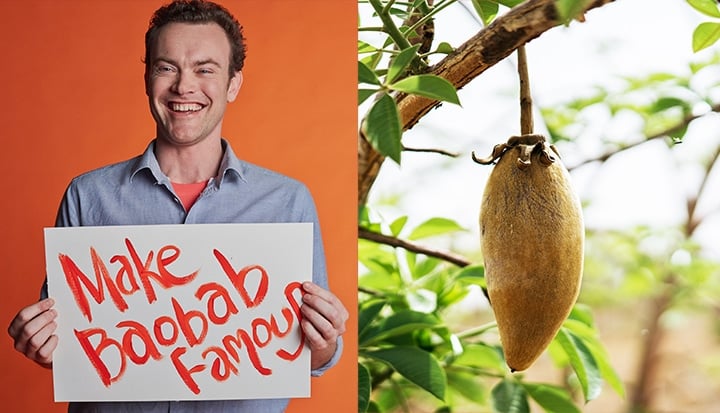15 years ago I was working in the London advertising industry, promoting products I didn’t believe in for clients who didn’t appreciate it. I ended up asking myself ‘What am I doing with my life?’ The lack of a sense of true purpose and meaning in my life lead me into a downward spiral and, when I was just 25, I had a complete nervous breakdown
At my lowest ebb, I was looking around my flat at the different objects, and I thought to myself: “The table is useful because you can put things on it. The sofa is useful because you can sit on it. The TV is useful because it can entertain you. I am the only thing in this room that has no purpose or use whatsoever.” It was a devastating thought.
I tried everything to heal myself, ranging from antidepressants and psychotherapy to acupuncture and faith healers. But nothing made any difference. Then one morning, I received a random phone call from a family friend, offering me the opportunity to volunteer my marketing skills to a farming project in The Gambia. “No thank you very much”, I thought, “If I’m going to be suicidal I would rather do it from the comfort of my own living room”. Thankfully my friends and family had other ideas and a few weeks later I arrived in “The Smiling Coast of Africa”, ironically, clinically depressed.
Within just a few weeks of being in the warm embrace of The Gambia, however, I experienced a personal miracle: I came back to life. And instead of returning home as originally planned, I ended up staying for four years, running a social enterprise that worked with small-scale farmers of fruits and vegetables.
During my time in The Gambia, I witnessed first-hand the abject failure of the aid model for agricultural development in Africa. Every year millions of dollars are “invested” in time-bound “development projects”, whereby thousands of women are trained – to grow X, Y or Z cash crop, which some highly-paid consultant has identified as being the next big thing.
Tragically – and amazingly – little to no thought has been given to who is actually going to buy these crops. All the focus is on supply rather than demand. The project eventually expires and the women have little choice but to uproot the crops, go back to their traditional subsistence activities and wait for the next aid project to come along. And the downward spiral of aid dependency continues.
What is even more extraordinary, however, is that at the very same time as all this wasteful production, Africa’s rural landscape has an abundance of existing and high potential indigenous crops – which go completely overlooked. In fact, more than 25% of the world’s botanical species originate from Africa, but less than 1% of what we see on the shelf in the $1tn+ global health and wellness market. This statistic tells its own story. The very most extraordinary example of this dynamic is what we have come to call ‘The Inspiring Possibility of Baobab’.
Baobab is the highly nutrient-dense fruit of Africa’s “Tree of Life”. It is rich in vitamin C, prebiotic fibre and antioxidants and has a delicious zingy sherbet flavour: if there is such a thing as a superfood then this is it. It also happens to be the only fruit in the world that dries naturally on the branch, meaning it does not require refrigeration, and just needs to be harvested and sieved to produce an organic superfruit powder. It gets better.
There is no such thing as a baobab plantation; every tree is community-owned and wild-harvested. Growing in the driest, remotest regions of 32 African countries, up to 10 million rural households can supply baobab fruit from a crop that is so abundant it goes mostly waste. National Geographic estimated that if there were a global demand for baobab this existing crop could be worth a billion dollars to rural Africa.
The only problem is that 95% of people have never heard of it.
So what would need to happen for this inspiring possibility to become a reality? We would need to create that demand. To manifest a market. Or, in other words, we need to Make Baobab Famous.
The company I co-founded, Aduna is an Africa-inspired superfood brand and social business. Our mission is to do just that: to create an international market for under-utilised African natural products like baobab, thereby creating sustainable incomes for rural African households. We call it “the demand creation model”.
Through our #MakeBaobabFamous campaign we have catalysed the creation of a global market for baobab. Within this, through our own proprietary value chain, we are now generating entirely additional incomes for over 1,100 women in 35 communities in Northern Ghana and Southern Burkina Faso, where our supply chain is based. And we are just getting started. In Northern Ghana alone there are more than 8,000 communities who could participate in the value chain if only the market were big enough.
This is where we hope that you and the organisations you work for come in. If we are to create a new billion-dollar industry for rural Africa we need the support of the private, public and not-for-profit sectors. In partnership, we can scale the demand for baobab and turn it into a household name; the new “must-have” ingredient for food and beverage manufacturers and shorthand for “ethical, sustainable and healthy”. If you feel inspired to help us and to create lasting transformation for millions of rural African households, please do not hesitate to get in touch.
Editor’s Note
Coming from an extremely challenging psychological space to find a renewed sense of purpose, it was a pleasure to welcome Andrew to Business Fights Poverty Oxford 2019 as our closing keynote speaker, to share his story.
Budding social entrepreneur, investor, or forward-thinking company looking to build a resilient supply chain? Then Andrew’s keynote is one to watch! You can find out more about Aduna at www.aduna.com.
Editor’s Note:
Coming from an extremely challenging psychological space to find a renewed sense of purpose, it was a pleasure to welcome Andrew to Business Fights Poverty Oxford 2019 as our closing keynote speaker, to share his story.
Budding social entrepreneur, investor, or forward-thinking company looking to build a resilient supply chain? Then Andrew’s keynote is one to watch! You can find out more about Aduna at www.aduna.com.










